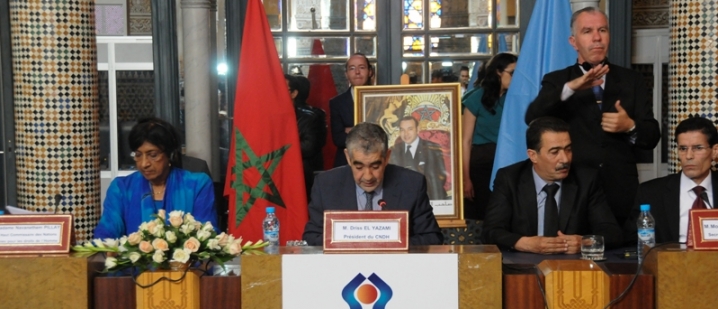UN High Commissioner for Human Rights’ visit to CNDH: a visit for encouragement and hope

UN High Commissioner for Human Rights, Navi Pillay, held a meeting with Chairman of the National Human Rights Council, Driss El Yazami, at the headquarters of the Council in Rabat, on Wednesday, May 28th 2014. The meeting was attended by CNDH Board members and Moroccan human rights, media, political; and civil society stakeholders.
Navi Pillay highlighted in her statement several pernicious affronts to human rights, including inequality and discrimination, migration, the threat of counter terrorism tactics, equality of women, death penalty, etc. She was concerned by the growth in hate speech by both political and religious leaders, and the harmful negative stereotyping of national, ethnic and religious minorities, which can be very dangerous, she said. Pillay was also concerned by the situation of civil society activists and human rights defenders, which are the lifeblood of the international human rights system. “Here [in Morocco]… I have witnessed first-hand the presence of a dynamic and autonomous civil society” she said.
The UN High Commissioner recognized the progress Morocco has made in the area of human rights. “Morocco has made great strides on human rights. It has established a strong human rights institutional architecture, for example the National Council for Human Rights, and has a good record of cooperation with the international human rights mechanisms”, she said. She added that Morocco has come a long way from its past legacy, thanks to the Equity and Reconciliation Commission, which established the truth about past violations, provided reparations for victims and families and made recommendation to prevent further violations.
Nonetheless, as in all countries in the world, a number of challenges remain in Morocco, she said. “Some of them will require a shift in traditional ideas; other need strong policy leadership”, for example the need to eradicate mistreatment and violence against women.
In his statement, Mr. Driss El Yazami considered the visit of the UN High Commissioner for Human Rights “a message for encouragement and hope”: encouragement for the reform packages that Morocco has launched to turn the page of its past legacy and prevent further violations, to open and promote public, peaceful and multiparty debate, to establish parity and gender equality, eradicating discrimination and promoting respect for migrants’ dignity; and hope the visit will help expedite the implementation of the reform packages: the reform of the judiciary, freedom of the press, parity and gender equality, eradicating mistreatment and violence against women, etc.
At the end of her three-day visit to Morocco, the UN High Commissioner for Human Rights held a press conference here in Rabat, on 29 May 2014, for her remarks and conclusions. In her statement, Ms Pillay saluted the role of the National Human Rights Council in the protection and promotion of human rights, urged the full support of local and national authorities with the Council, and offered technical assistance and capacity building for the regional commissions of the CNDH.
Brief interview with UN High Commissioner for Human Rights Navi Pillay
Statement of UN High Commissioner for Human Rights Navi Pillay at the CNDH






















